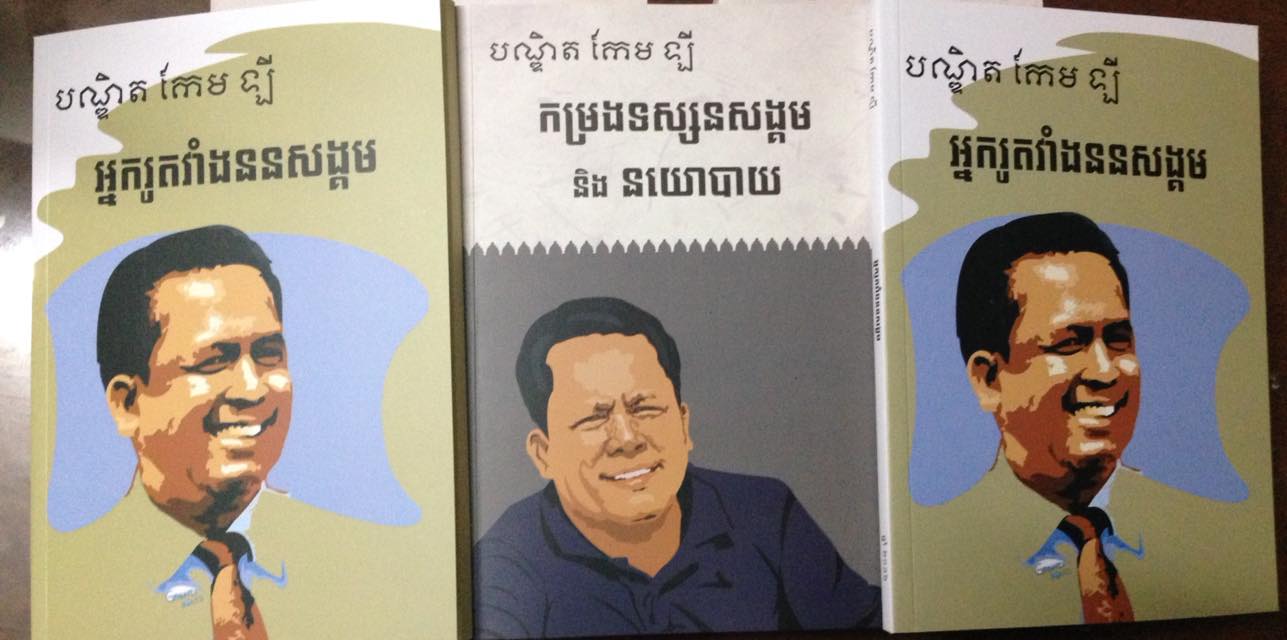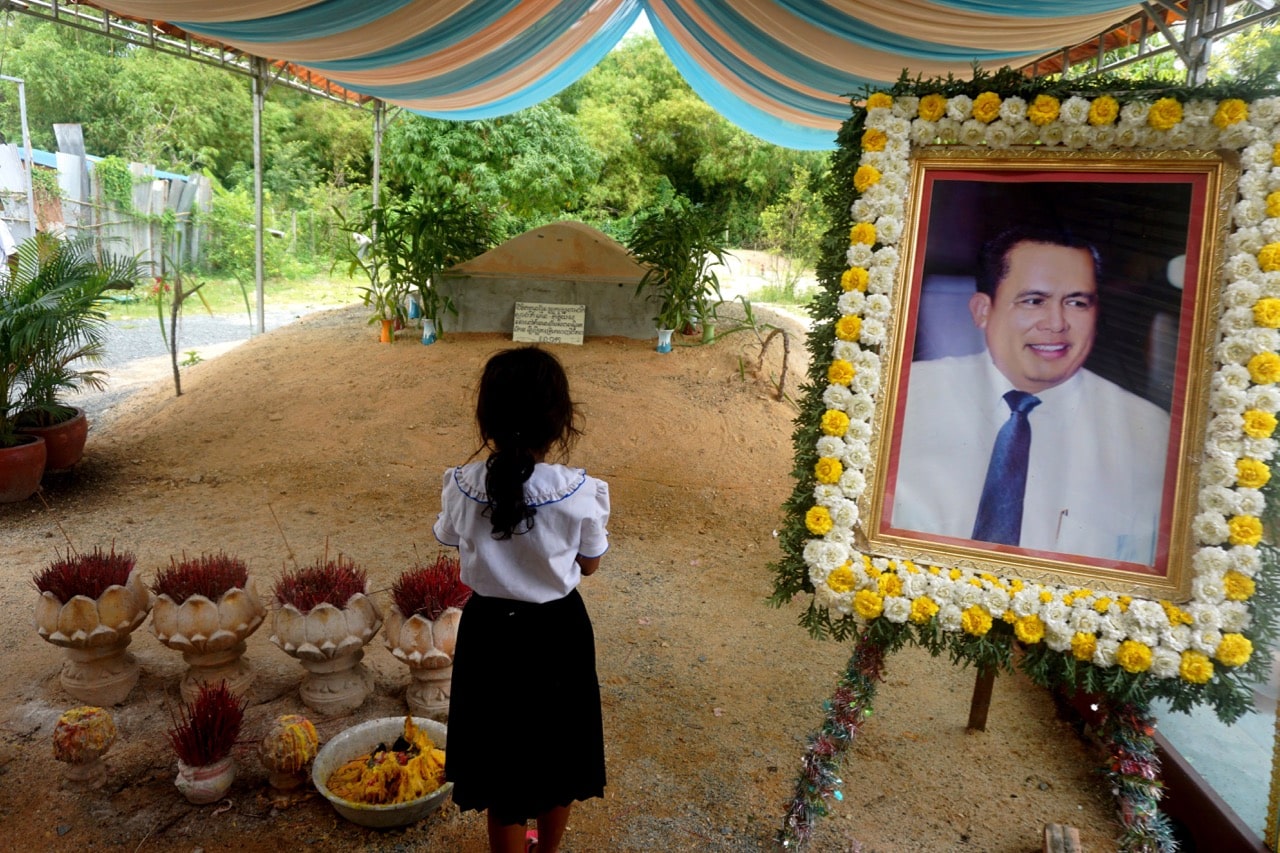"Wipe your tears, continue your journey," a quote made famous by activist Kem Ley, is becoming the rallying cry of a growing number of Cambodians embracing his legacy.
If the aim in killing Cambodian political analyst and commentator Kem Ley was to silence him and his advocacy, then those who ordered it have clearly failed. More than a year after his brutal slaying in central Phnom Penh, Kem Ley’s legacy is bravely kept alive by ordinary citizens who are continuing the struggle for justice, truth and accountability in governance, and a better future for the youth.
The failure of those who conspired to make Kem Ley irrelevant was evident even on the day of his murder. When news of his death quickly spread through social media, hundreds immediately flocked to the streets near the crime scene and joined a spontaneous protest. Instead of instilling fear, Kem Ley’s death roused the public to express outrage against what many believe to be yet another gruesome case of extrajudicial killing.
The crowd continues to grow as people accompany the body of slain political commentator Kem Ley. pic.twitter.com/UdvqlI0x2U
— Ruom (@RuomCollective) July 10, 2016
Kem Ley’s funeral march on 24 July 2016 was attended by hundreds of thousands of Cambodians, and described by the media as the country’s largest funeral procession since the death of King Norodom Sihanouk in 2013. During the 90-kilometer funeral procession marking the 100 days since Kem Ley’s murder, tens of thousands lined the streets from Phnom Penh to Takeo (Kem Ley’s home province), waving flags, holding up portraits of him, and chanting democracy slogans. Poems, songs, and other artworks in honour of Kem Ley were shared by artists in solidarity with those who saw the killing of Kem Ley as an attack on free speech and democracy.
Kem Ley’s murder became another stark example of the worsening impunity in Cambodia. It raised fears that Prime Minister Hun Sen, who has been in power for more than three decades already, is bent on intensifying a crackdown on critical voices ahead of the 2018 general elections.
Aside from Kem Ley’s death, activists and human rights groups have cited the state-sponsored harassment of opposition politicians, the detention of land rights activists, the filing of criminal cases against social media critics and members of the media, and threats to outlaw foreign-funded groups as worrying indicators of a rising intolerance for dissent under the Hun Sen government.
Who was Kem Ley?
Kem Ley was a prominent political analyst who was known for explaining public issues in a simple and direct manner, easily understood by his readers and listeners. As a researcher, he consistently criticized many policies of the Hun Sen government. But his hard-hitting political commentaries didn’t spare other groups, including the opposition.
He was more than just a keen observer of Cambodian politics. He founded the Grassroots Democracy Party (GDP) in 2015 as an alternative political party, to unite and empower citizens in remote communities, and launched the ‘100 Nights Campaign’ in May 2016, which involved an extended tour of the countryside to explore the problems of rural families.
Kem Ley’s last radio interview took place two days before his murder. He was asked to share his views about an explosive Global Witness report on the vast business empire of Hun Sen’s family entitled ‘Hostile Takeover’. During the interview, Kem Ley urged the prime minister to be transparent about his family’s financial transactions and to convincingly refute the allegations in the report that they own more than 100 corporations.
Flawed trial
The police arrested former soldier Oeuth Ang on the same day of Kem Ley’s murder. He identified himself as ‘Choub Samlab’ (‘Meet to Kill’ in English), and claimed that he killed Kem Ley because the latter owed him US$3,000. On March 23, 2017, he was sentenced to life imprisonment for premeditated murder and illegal possession of weapons.
Many analysts have pointed out that the trial’s prosecution team didn’t pursue other leads, such as CCTV footage which showed police officers talking to the suspect a few minutes after the killing of Kem Ley, the absurdity of the suspect’s claimed motive – which even his wife has publicly repudiated – and the testimony of key witnesses that the suspect met with senior military and local officials a week before committing the murder.
Meanwhile, if the court was reluctant to accept new evidence that could potentially reveal the brains behind Kem Ley’s murder, they were very enthusiastic when it came to the treatment of opposition politicians, who were swiftly found guilty of defamation for simply giving interviews and commenting on social media about the possible involvement of the Hun Sen government and the ruling party in the killing of Kem Ley.
This political cartoon by Patrick Samnang Mey reflects the sentiment of many Cambodians: Who ordered Oeuth Ang to kill Kem Ley? In an interview with IFEX, the cartoonist reminded his fellow artists that “the ideal way to promote Kem Ley’s legacy would be for artists to voice their political ideas without restraint.”
You can read more about Kem Ley’s case on IFEX’s No Impunity campaign page, here.
Global vigilance
Aside from Kem Ley’s family and friends, local and international non-government organizations (NGOs) are among those who have been actively monitoring the case and working hard to sustain public interest in the continuing quest for justice. More than 150 NGOs signed a petition this year urging the establishment of an independent and impartial commission to probe the killing of Kem Ley. Their campaign reached various UN agencies, and is helping to build global awareness about Kem Ley’s case and the alarming deterioration of democracy in Cambodia.
Death anniversary
Kem Ley’s death anniversary in July 2017 was commemorated by various individuals and groups – not just to honor his memory, but to engage more people in seeking truth and justice. Activities were held in Phnom Penh, Takeo, Banteay Meanchey in northwest Cambodia, and even in Melbourne, Australia. Participants included former colleagues and friends, but also Buddhist monks, students, artists, workers, NGOs, and other concerned Cambodians who had been directly or indirectly influenced by Kem Ley’s work. It was an occasion that underscored how Kem Ley remains an icon of political inspiration for people across the country, and beyond.
The work goes on: GDP and YAG
Grassroots Democracy Party has vowed to pursue the fight for justice. It plans to participate in the 2018 elections through its current citizen representation in 10 communes of Phnom Penh, Kampong Speu, Kampot and Takeo provinces.
Another group founded by Kem Ley is the Young Analysts Group (YAG). Before his death, he devoted a lot of time to mentoring students and young intellectuals on how to become effective political analysts. In hopes of producing a new generation of Cambodians who could spark the revitalization of the country’s political culture, he trained students in basic research, journalism, and analysis. His untimely demise has not brought an end to his vision for YAG. The group continues its work.
We will make Cambodia Great Again by improving Social Research and Development. Young Analysts Group in Cambodia pic.twitter.com/CT9xzesg8d
— Hang Vitou (@HangVitou) January 31, 2017
Hang Vitou, also a founding member of YAG, told IFEX about the status of their group, which now has 23 members.
“The situation of our group is fine, though there are some difficulties, threats or intimidation from the local rulers; but we still continue our mission which was set up by Dr. Kem Ley when he was alive.”
Hang Vitou added that YAG continues to train young people in the methods of Kem Ley, including carrying out social and political research at the grassroots level. Further, trainees are encouraged to improve their creative thinking by holding weekly debates, conducting study visits in various localities, and practicing their skills in the radio station.
Books of remembrance
Currently, YAG is compiling the writings of Kem Ley, which it intends to publish in order to promote the ideas of the group’s founder.
A similar initiative was carried out last year by the Khmer Student Intelligent League Association, which published nearly 13,000 copies of two books based on Kem Ley’s political satires and his research on corruption, deforestation, and other development issues. The group distributed 1,000 books to university libraries in Phnom Penh.
“Wipe your tears, continue your journey”
The above quote was made famous by Kem Ley himself; and after his death, it became the rallying call of his friends and supporters. Indeed, while many continue to grieve, a growing number of Cambodians who knew Kem Ley are also stepping up their resolve to embrace his legacy of promoting grassroots activism, transparency and good governance, equality and human rights.
For Chak Sopheap, Executive Director of the Cambodian Center for Human Rights, there is no better way to honor Kem Ley than to continue his social justice advocacy:
“As Cambodia is currently experiencing a major crackdown on independent media, NGOs, and the political opposition, it is vital that ordinary Cambodians speak up and do not allow this to happen in silence. The greatest tribute anyone could pay to Kem Ley would be to get involved in the promotion of human rights and social justice at the grassroots level.”

Patrick Samnang Mey

Facebook/Khmer Student Intelligent League Association



